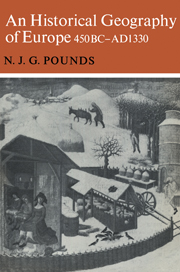3 - Europe in the age of the Antonines
Published online by Cambridge University Press: 05 June 2012
Summary
The reigns of Hadrian and the two Antonines, which together spanned much of the second century A.D., constitute one of the few periods in human history to which subsequent generations have looked back with reverence and longing. It fell short in artistic achievement of the level set by Periclean Athens or even Augustan Rome, but more than made up for this by its attention to human welfare and happiness. ‘Their united reigns,’ wrote Gibbon, not without a certain exaggeration, ‘are possibly the only period of history in which the happiness of a great people was the sole object of government.’ Aristeides, who lived under the benevolent rule of Antoninus Pius, claimed in a rhetorical flourish that he could not remember when this peace was broken, and relegated stories of war to the category of legend, so profound was the peace amid which he lived. While he wrote, however, there was conflict along the northern frontier of the Empire and revolt in Britain and in some of the African and Asian provinces.
A long period of economic growth had preceded the age of the Antonines, The population had increased; agriculture had penetrated the forest and waste, and villas and scattered farms had, at least in the more peaceful provinces of the Empire, replaced the nucleated and defensible villages. ‘Cultivated fields have overcome the forests,’ wrote Tertullian, ‘the sands are being planted, the rocks hewn, the swamp drained; there are as many cities today as there were formerly huts.’
- Type
- Chapter
- Information
- An Historical Geography of Europe 450 B.C.–A.D. 1330 , pp. 95 - 169Publisher: Cambridge University PressPrint publication year: 1973



